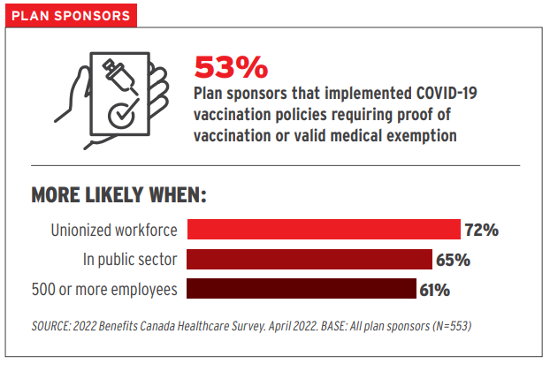Continuing our review of the recent survey done by Benefits Canada and the valuable data that it shares, this month we cover workplace supports for health and wellness. We take a closer look at how wellness relates to job satisfaction, mental health, DEI and discrimination, and COVID-19 policies.
The pandemic does not appear to have had a lasting impact on plan sponsors’ efforts outside of the health benefits plan to support employee wellness. In fact, it may have strengthened their resolve.
Plan members who reported their employer supports employee wellness are not only more likely to be physically and mentally healthy, but also to be satisfied with their jobs. For the first time, the survey asked members about experiences of workplace discrimination and the ability to be their authentic self at work — and results speak to the need to build diversity, equity, inclusion and accessibility into a wellness strategy. Of note is the finding that employees with chronic diseases that may result in physical disability experienced high levels of discrimination.

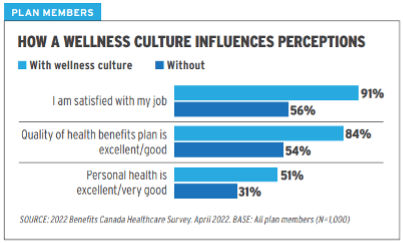 | 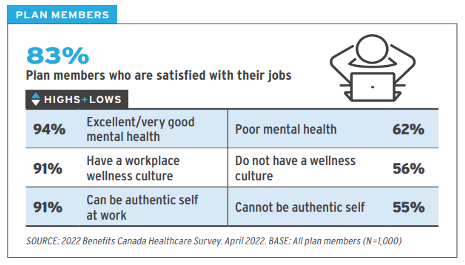 |
A deeper-dive into mental health supports
- For the first time, the survey asked plan members and plan sponsors if they feel their workplace environment supports mental wellness. 75% of members and 86% of sponsors agreed that it does.
- Among plan members, agreement was much higher among those who also said their workplace has a wellness culture (91% versus 25% who do not have a wellness culture).
- When the work environment supports mental health, 45% of members described their personal mental health as excellent or very good, compared to 23% among members without such supports. Similarly, 52% and 28%, respectively, described their overall health as excellent or very good. Job satisfaction was also higher.
- As well, plan members were much more likely to describe the quality of the health benefits plan as excellent or good when workplace mental-health supports are available (84% compared to 54%).
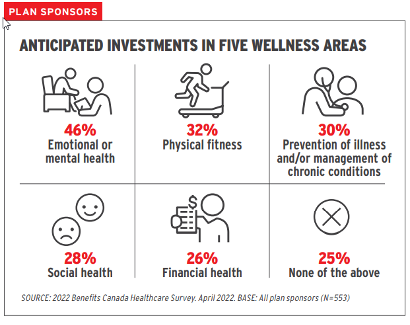 | 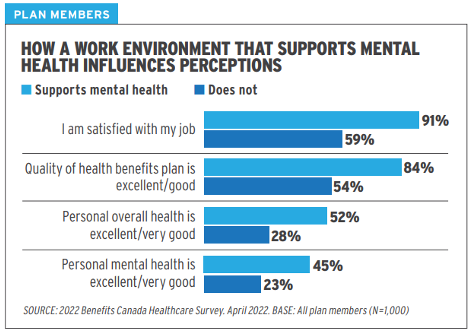 |
Discrimination, authenticity and DEI
- 31% of surveyed plan members identified themselves as Black, Indigenous or a person of colour (BIPOC).
- Overall, one in four (27%) plan members agreed they have experienced discrimination in the workplace, increasing to 35% among those who are BIPOC (compared to 22% of Caucasian respondents).
- Chronic diseases that are apparent or may result in physical disability also appeared to be a factor: 42% of members with asthma/lung disease, 41% with obesity and 38% with chronic pain have experienced discrimination in the workplace.
- Members who have been discriminated against were twice as likely to experience high or extremely high levels of stress (43% versus 21% among those not discriminated against).
- One in five (21%) plan members said they do not feel comfortable enough in their organization to be their authentic self.
- Members who cannot be their authentic self were less likely to be satisfied with their job or their health benefits plan and more likely to describe their mental health as poor.
- Nine out of 10 (91%) plan sponsors agreed they promote and support a diverse and inclusive workplace.
 | 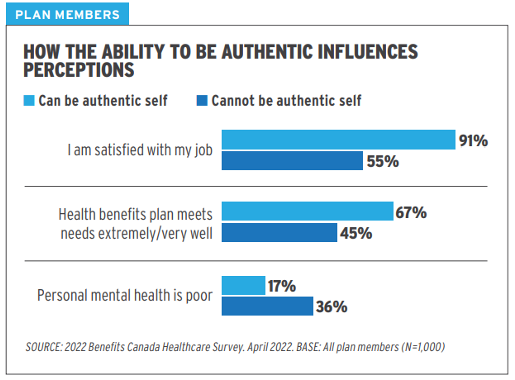 |
COVID-19 vaccinations and policies
- 65% of plan members and 53% of plan sponsors said their workplace implemented a COVID-19 vaccination policy.
- Among plan sponsors, vaccination policies were more likely with unionized workforces (72% versus 44% among non-unionized workforces), in the public sector (65% versus 49% in the private sector) and employers with 500 or more employees (61% versus 40% with fewer than 50 employees).
- Very few plan sponsors felt the vaccination policy (5%) or lack thereof (4%) had a negative impact on their ability to attract and retain employees. The majority (56%) of those with a policy felt it had a positive impact and about a third (39%) felt it had no impact. The results were reversed among those without a policy: 38% felt this decision had a positive impact and 58% felt it had no impact.
